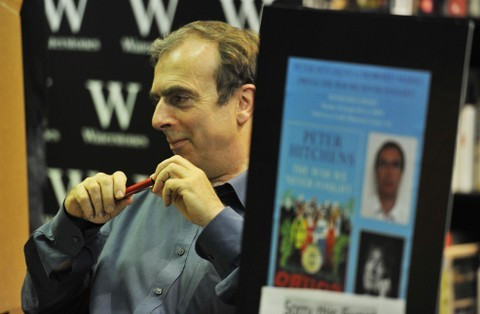Peter Hitchens on Drugs, the Police and Agreeing with Russell Brand

Peter Hitchens is used to being treated as the "lunatic fringe" of the British commentariat but contrary to what some may believe he does not appear to enjoy his status as the crazy uncle who should be let on Question Time every now and again but otherwise ignored.
His latest book, "The War We Never Fought: The British Establishment's Surrender to Drugs" is a case in point. When we meet in the branch of a well-known coffee chain Hitchens predicts with resignation, "It will be met with geysers of slime or totally ignored by the people I most want to read it." Which of those he would prefer he does not say.
This is a great pity as the book, which is more of a history of cannabis than a polemic against it, has a great many facts and arguments which are far from lunatic or crazy. For one thing Hitchens makes no overblown claims about the dangers of cannabis to mental health, but still manages to build up a large portfolio of "anecdotal evidence" that strongly suggests that cannabis is neither "soft" nor harmless.
Proof that cannabis is detrimental to mental health, Hitchens argues, is nearly impossible as the definition of mental illness itself is so sketchy. "The only measure of mental illness generally is not objective, it's the American Psychiatric Association's diagnostic and statistical manual, which is now about to go into its 5<sup>th edition and changes all the time... You can't therefore say with any certainty by seriously repeatable objective tests that somebody has psychosis or schizophrenia in the same way that you can say that someone has cancer of the lung."
The risk that cannabis will cause irreversible mental illness destroys any notion that smoking dope is what pro-legalisers call a "victimless crime" according to Hitchens. "The victims tend to be the person closest to the user."
One such victim is Patrick Cockburn, whose book, Henry's Demons, records the mental illness suffered by Cockburn's son after heavy cannabis use at a young age and is described by Hitchens as "one of the most moving and gruelling accounts of this".
While some would describe Cockburn's account as "anecdotal" Hitchens, backed up by Cockburn, points out it is in no way an unusual one. "It's a fact of life among parents of my generation that they either have children or friends of their children who heavily use cannabis who have subsequently become seriously irrevocably mentally ill."
Perhaps surprisingly Hitchens strongest condemnation for a lax approach to cannabis falls, not upon politicians like Richard Crossman, Baroness Wootton or even Roy Jenkins who often takes the role of villain in Hitchens' books (although Hitchens says it's nothing personal) and his trenchant weekly columns in the Mail on Sunday, but upon the police.
"Senior police officers who have actually stood up and lobbied against the drug laws seem to me to be in breach of their oaths of office. They swear to uphold the law. It is absolutely not their job to make public pleas against the law they are sworn to uphold... [It's] morally wrong - probably legally wrong as well - I'm amazed they get away with it."
Even more surprising though is the news that Hitchens has Russell Brand (with whom he recently clashed on Newsnight) as an ally against the methadone programme, which he says robs taxpayers to provide drugs to heroin users and, according to Professor Neil McKeganey, may kill more people in Edinburgh than actual heroin.
"Even Russell Brand - bless him - is against the methadone programme. Even he can see through it." However the compliment is short-lived as Hitchens follows up by saying that even a hamster can see this.
Although apparently resigned to being ignored and ridiculed Hitchens, 61, still believes that he can be of some use to the causes he puts his name to. "For people like me who are considered to be lunatic fringe elements it actually makes it easier for other people who are not on the fringe to start saying a bit later on after we've gone. I'm the first wave, I go up over the top and get machine gunned down and the second wave might have a slightly better chance."
Having done his bit to point out that the war on drugs is one we have never fought, Hitchens' next book project will be about a war we most certainly did fight, the Second World War (or the "national religion" as he calls it). The book will be called "The Phoney Victory".
"We all think we won when we lost." Certainly no one could accuse Peter Hitchens of having the same assessment of his own war on drugs.
For the full transcript of the interview click here.
For a review of The War We Never Fought click here.
© Copyright IBTimes 2025. All rights reserved.




















